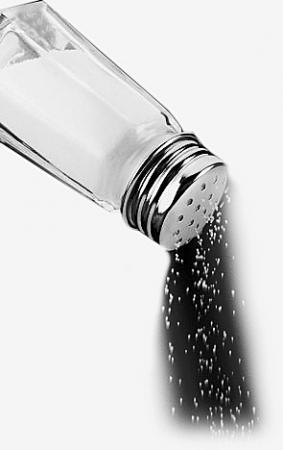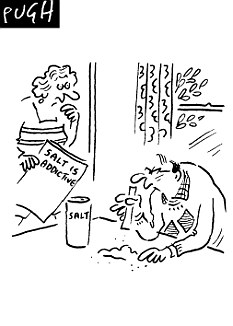摘要:英国《每日邮报》网站7月12日报道题:为什么盐会上瘾:它就像香烟和麻醉品一样刺激脑细胞。
研究人员说,盐会像香烟和麻醉品一样让人上瘾,对盐的渴求会刺激同样的基因、脑细胞和大脑连接神经元。
这一发现将有助于解释,为什么许多人明明知道盐会影响血压和心脏健康,却仍然难以控制盐的摄入量。
在研究中,澳大利亚和美国的科学家给一组实验鼠提供低盐食物,另一组则进行盐水滴注。
他们将这些老鼠的脑部活动与正常饮食的老鼠的脑部活动进行了比较。他们还让一些老鼠3天不摄入盐,然后再让它们尽情喝盐水,在此过程中观察它们的脑部活动。
当老鼠需要盐时,脑细胞就会产生与海洛因、可卡因和尼古丁等上瘾物质有关的蛋白质。
墨尔本大学教授德里克·登顿说:“在这项研究中,我们发现,对盐的本能需求会产生促使对鸦片和可卡因上瘾的神经结构。”研究还显示,摄入盐之后,大脑在盐还没有真正进入血液系统并流经大脑之前就已感到满足。
研究人员说,盐对整体健康的重要性意味着,人对盐的需求是深深植根在大脑中的“古老本能”。这也能解释为什么我们对咸味食物如此偏爱。
试验还显示,阻止老鼠从吃盐中获得快感能在一定程度上减少它对盐的需求。研究报告发表在《国家科学院院刊》(PNAS)上。
生物探索推荐英文论文摘要:
Relation of addiction genes to hypothalamic gene changes subserving genesis and gratification of a classic instinct, sodium appetite
Abstract
Sodium appetite is an instinct that involves avid specific intention. It is elicited by sodium deficiency, stress-evoked adrenocorticotropic hormone (ACTH), and reproduction. Genome-wide microarrays in sodium-deficient mice or after ACTH infusion showed up-regulation of hypothalamic genes, including dopamine- and cAMP-regulated neuronal phosphoprotein 32 kDa (DARPP-32), dopamine receptors-1 and -2, α-2C- adrenoceptor, and striatally enriched protein tyrosine phosphatase (STEP). Both DARPP-32 and neural plasticity regulator activity-regulated cytoskeleton associated protein (ARC) were up-regulated in lateral hypothalamic orexinergic neurons by sodium deficiency. Administration of dopamine D1 (SCH23390) and D2 receptor (raclopride) antagonists reduced gratification of sodium appetite triggered by sodium deficiency. SCH23390 was specific, having no effect on osmotic-induced water drinking, whereas raclopride also reduced water intake. D1 receptor KO mice had normal sodium appetite, indicating compensatory regulation. Appetite was insensitive to SCH23390, confirming the absence of off-target effects. Bilateral microinjection of SCH23390 (100 nM in 200 nL) into rats’ lateral hypothalamus greatly reduced sodium appetite. Gene set enrichment analysis in hypothalami of mice with sodium appetite showed significant enrichment of gene sets previously linked to addiction (opiates and cocaine). This finding of concerted gene regulation was attenuated on gratification with perplexingly rapid kinetics of only 10 min, anteceding significant absorption of salt from the gut. Salt appetite and hedonic liking of salt taste have evolved over >100 million y (e.g., being present in Metatheria). Drugs causing pleasure and addiction are comparatively recent and likely reflect usurping of evolutionary ancient systems with high survival value by the gratification of contemporary hedonic indulgences. Our findings outline a molecular logic for instinctive behavior encoded by the brain with possible important translational–medical implications.
生物探索推荐英文原文报道:
Why salt is addictive: It stimulates the brain cells just like cigarettes and hard drugs
Some will no doubt take the news with a pinch of salt.
But researchers claim that salt is addictive in the same way as cigarettes or hard drugs, with the craving triggering the same genes, brain cells and brain connections.
The finding could help explain why many find it so hard to cut back on salt, despite warnings about dangers to blood pressure and heart health.

Fish and chips wouldn't be the same without it: But now scientists say the yearning for salt stimulates the brain like addiction to hard drugs
For the study, Australian and American scientists kept some mice on low-salt diets and gave others a salt drip.
Activity in the creatures' brains was then compared with that in mice fed normally. They also studied the brains of mice that had been starved of salt for three days and then given salty water to drink freely.
When the rodents were in need of salt, brain cells made proteins more usually linked to addiction to substances such as heroin, cocaine and nicotine.
Professor Derek Denton, of the University of Melbourne, said: 'In this study we have demonstrated that one classic instinct, the hunger for salt, is providing neural organisation that subserves addiction to opiates and cocaine.'
The study also revealed that after salt was taken, the brain believes it has received its fix well before it should be physically possible.
In other words, the changes caused by salt cravings disappeared well before the salt could have left the gut, entered the blood and got to the brain.
Professor Denton said: 'It was amazing to see that the genes that were set "off" by the loss of sodium were already beginning to get back to the original state within ten minutes.
'It is an evolutionary mechanism of high survival value because when an animal is depleted of water or salt it can drink what it needs in five to ten minutes and get out which makes it less susceptible to predators.'

The researchers said that the importance of salt to overall health means that cravings for it form 'an ancient instinct' deeply embedded in the brain. This may explain why we find salty foods so tasty.
Experiments also revealed that stopping the mice from getting a feeling of pleasure from eating salt partially quenched the animals' appetite for the condiment, the journal Proceedings of the National Academy of Sciences reports.
Dr Wolfgang Liedtke, of Duke University in North Carolina, said: 'We were surprised and gratified to see that blocking addiction-related pathways could powerfully interfere with sodium appetite.'
The average Briton consumes 8.6g of salt a day – way above the recommended limit of 6g.
A recent University of Exeter study of almost 6,500 people concluded there was 'no strong evidence' that lowering levels in the diet reduced the risk of heart disease or premature death.
In fact it found that cutting back on salt actually raises the likelihood of death in some patients with heart problems.
However, health campaigners said this was because salt reduction needs to be over a longer period than the study monitored to have an impact.







